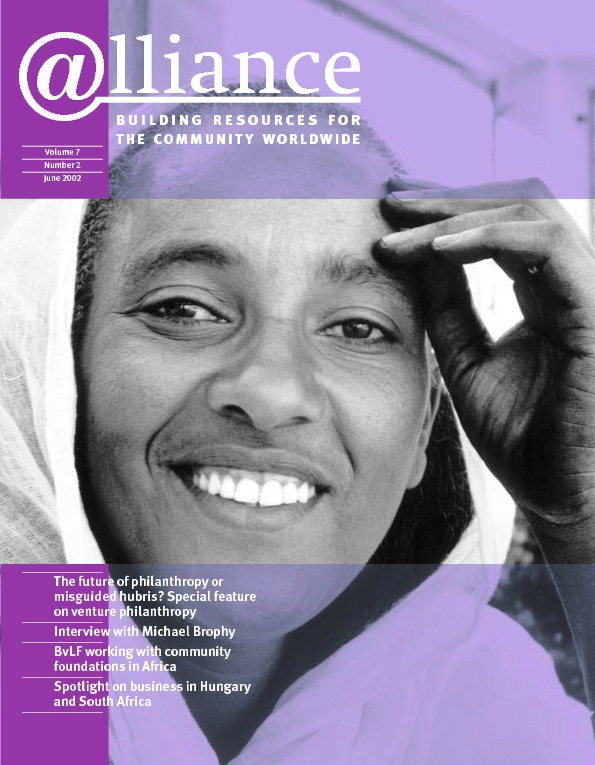The World Social Forum (WSF) in early February 2002 in Porto Alegre, Brazil demonstrated clearly that the so-called anti-globalization movement that gathered under the slogan ‘Another World is Possible’ is maturing rapidly. By contrast, the World Economic Forum (WEF), the meeting of global corporate and government elites in New York’s Waldorf Astoria, was dominated by insecurity – not just about the state of the globe but about whether the WEF delegates really have the right answers to the world’s many problems.
Partly because of the success of the WSF last year, the WEF broadened its agenda to feature social issues such as poverty, social inequality and the fight against the HIV/AIDS-pandemic – issues that also figured prominently on WSF’s agenda. This suggests a most significant turning of the tide. Until recently, the agenda for global deliberations has been set by the large UN conferences and the meetings of the Bretton Woods institutions and G8 countries. Civil society, actually without much resistance, has taken a back seat in responding to this agenda. This year’s WSF was the first time global civil society had come together on its own terms and around its own agenda. And this agenda also had an impact on the discussion at the WEF.
Additionally, unlike most earlier citizen gatherings around the globalization issue, Porto Alegre was marked by an absence of violent protests. Despite the much greater numbers at WSF, there was nothing resembling the security presence that was seen in New York.
WSF – on a fast track to maturation
Civil society leaders have become increasingly focused on how the global citizen movement is viewed by the public. This is exemplified by the explicit rejection of the misnomer ‘anti-globalization movement’ and a debate about an alternative name that captures the positive values of its members. The issue has not been resolved but many suggestions are on the table, ranging from ‘deglobalization’, ‘pro-democracy’ or ‘earth democracy movement’ to ‘fair globalization’, ‘social justice’ or ‘living democracy movement’.
The deliberations by participants in more than 800 workshops and some high-profile panel discussions were timely and profound. Informal discussions and networking among representatives of more than 4,800 civil society organizations built more knots in an increasingly close-meshed net of transnational civic activism. Many observers predicted a crisis for the ‘anti-globalization movement’ in the aftermath of September 11. Ironically, the backlash against the movement post September 11 may well have induced civil society leaders to adopt a more strategic, focused and reflective approach. It now seems clear that the movement is on a fast-track maturation process. The success of the WSF is also reflected in mainstream media coverage and opinion (outside of the US), which was wider and much more positive than in 2001.
WEF – lacking in buzz
What about the WEF? Here the analyses in the mainstream media were much bleaker. The New York Times reported a ‘lack of buzz’, Le Monde talked of ‘dissension and moroseness’, Die Zeit declared this year’s event ‘a parody of its former self’. Those observers who are already ringing the death knell for WEF are probably premature in their prognosis. However, NGO participants at WEF did want to know what attempts were being made to foster dialogue with the convenors of WSF. Most NGOs in New York had bigger delegations in Porto Alegre. The management of the WEF, for the first time, is considering inviting NGO leaders to serve on an informal advisory mechanism ostensibly to ensure that greater weight is given to civil society views. While NGO participants certainly need to reflect on their ongoing participation in the WEF, what is clear is that NGOs were able to provide an alternative voice and raise important questions that otherwise would not have been addressed.
There are clear signs that the tide is turning towards a more open questioning of what substantive changes need to be made to ensure global economic and social justice – the Enron scandal and the Argentine economic crisis can only reinforce this trend. More importantly, many civil society activists seem to be up for the challenge to provide effective, thought-through and practicable alternatives. Whether these alternatives will be taken up by global leaders is, in the context of a missing system of democratic global governance, an open question.
Kumi Naidoo is Secretary General and CEO of CIVICUS. He can be contacted by email at kumi@civicus.org
Finn Heinrich is Project Manager of the CIVICUS Index on Civil Society project. He can be contacted at finn@civicus.org




Comments (0)